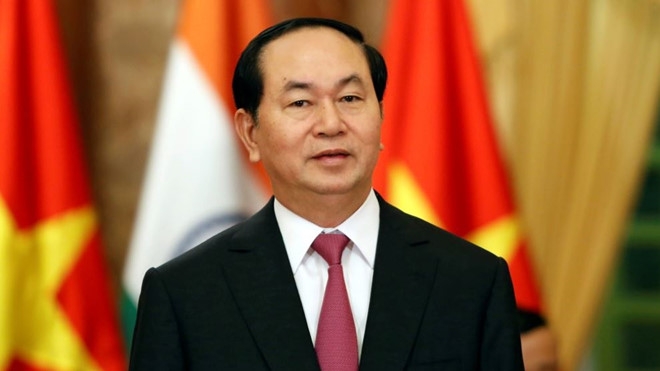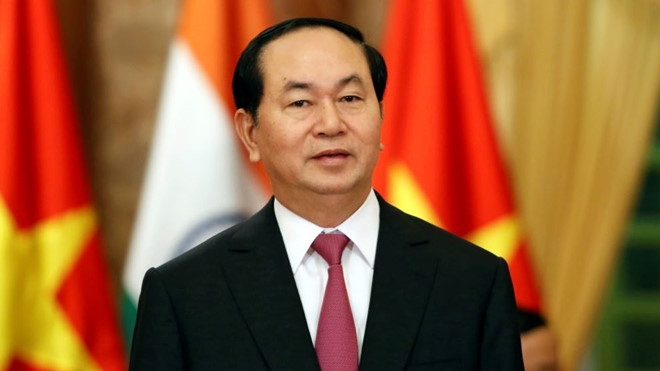
Vietnamese President Tran Dai Quang’s three-day state visit to Bangladesh aims to intensify trade and investment promotion, and create favourable conditions for business between the two countries to achieve a two-way trade goal of US$1 billion, according to the newspaper "Daily Star".

President Tran Dai Quang
The
Bangladeshi newspaper quoted a high level official at the foreign ministry as
saying that the bilateral trade volume between Bangladesh and Vietnam was
increasing.
In an article published on
February 28, ahead of President Tran Dai Quang’s visit, set to begin on March
4, the paper said "Bangladesh and Vietnam are enjoying economic cooperation,
with trade reaching US$609 million in 2016, from only US$93 million in 2009.
Bangladesh exports
pharmaceuticals, raw materials for garments, and machinery to Vietnam, while
Vietnam's major exports to Bangladesh include iron, steel, fibre, textiles,
plastics, rubber, and electronics.”
The article continued, "Dhaka
is eager to connect itself with the Association of Southeast Asian Nations,
whose members are Vietnam, Brunei, Cambodia, Indonesia, Laos, Malaysia,
Myanmar, Singapore, Thailand, and the Philippines. It will seek support from
Hanoi for its regional integration.”
"The two countries are likely
to sign about half a dozen agreements and memorandums of understanding for the
promotion of trade, investment, connectivity, and cooperation during the
visit,” it said.
President Tran Dai Quang will
visit Dhaka at the invitation of his Bangladeshi counterpart Abdul Hamid. He
will fly to Dhaka from New Delhi after a three-day visit to India.
Some 100 business
representatives from top Vietnam companies will accompany the President and
hold discussions with their Bangladesh counterparts, exploring trade and
investment potentials in Bangladesh.
A business forum will be held
at the Pan Pacific Sonargaon Hotel on March 6.
Bangladesh and Vietnam
established diplomatic relations on February 17, 1973. Since then, the
relationship of friendliness and cooperation between the two states has been
enhanced in a wide range of areas, especially in economy and trade.
Source: NDO
In the spirit of "Party members go first, the people follow”, all households of Party members in the Doan Ket sub-region in Da Bac town, Da Bac district, voluntarily removed gates and fences, and donated land when the road expansion project passed through their properties. Inspired by their example, 68 households in the sub-region quickly followed suit, contributing over 1,400 sq.m of residential and perennial cropland to widen the main road through the residential area. The exemplary role of Party members in Doan Ket stands as a shining example of studying and following President Ho Chi Minh’s thought, morality, and lifestyle.
The Hoa Binh provincial People's Committee held a monthly meeting on May 29 to assess the implementation of socio-economic development tasks in the first six months of 2025, the progress of key projects, and some other important issues.
During his lifetime, President Ho Chi Minh always expressed his deep affection and special concern for children and youth. He once emphasized: "Caring for and educating children well is the responsibility of the entire Party and the entire people”; "First of all, the family (i.e. grandparents, parents, siblings) must do this job well”. "the Party Committees…, the Children’s Committee, the Youth Union, the education sector, and all related organizations must have specific plans to ensure children grow healthier and more progressive”. His teachings has been remaining valuable and serving as the guiding principles in the work of protecting, caring for, and educating children. In line with this ideology, Hoa Binh Province has continuously been prioritizing and investing resources in the well-being of children in recent years.
Mr. Nguyen Phi Long, the alternate Member of the Party Central Committee and Secretary of the Provincial Party Committee chaired the meeting of the Standing Committee of the Provincial Party Committee to provide opinions on several investment projects within the province. There was the attendance of Ms. Bui Thi Minh, the Permanent Deputy Secretary of the Provincial Party Committee and Chairwoman of the Provincial People’s Council; Mr. Bui Đuc Hinh, the Deputy Secretary of the Provincial Party Committee and Chairman of the Provincial People’s Committee and other members of the Standing Committee; the leaders from other departments, agencies, and some localities.
The Standing Board of the Vietnam Fatherland Front (VFF) Committee of Hoa Binh province held a meeting on May 28 to honour outstanding village elders, village heads, and reputable individuals from local ethnic minority and religious communities.
In mid-May, the provincial Museum organised an exhibition named "Duoi la co Dang Cong san Viet Nam quang vinh” (Under the flag of the glorious Communist Party of Vietnam). This meaningful activity took place in the joyful atmosphere to celebrate the country's major holidays and the Party congresses at all levels for the 2025-2030 term, towards the 14th National Party Congress.



